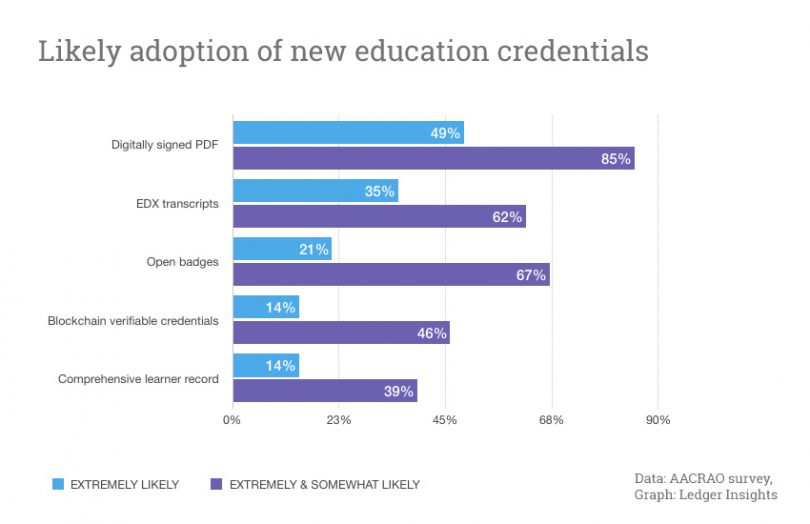Last week, the American Association of Collegiate Registrars and Admissions Officers (AACRAO) released a survey about current education credentials trends. AACRAO, with its 11,000 higher education professional membership, aims to improve record management in educational institutions. Blockchain verifiable credentials were not near the top of the list.
A key takeaway from the report is the need for educational credentials to go paperless. Paper-based processes are inefficient because the document’s can’t be reused, it’s time-consuming to get copies of the records, and they can be easily faked. While digital credentials have been around in one form or another for almost 30 years, the pandemic compelled most institutions to accelerate the shift towards some sort of digitized, interoperable and portable credentialing system.
The survey concludes that 32% of institutions plan to devote more resources to credential digitization and 89% report using at least one type of digital credential today. Still, most processes carried out at universities and colleges are paper-based.
AACRAO surveyed the use and perception of four digital credentials technologies: digitally signed PDFs, digital badges for a specific skill, electronic data exchange (EDX), and blockchain verifiable credentials. The overall goal is to establish an efficient environment for students to safely and credibly share their credentials with prospective employers or other educational institutions and reduce fraud opportunities.
There is a large gap in the adoption rates of each technology. Unsurprisingly, PDFs are the most common electronic credential, yet only 4% of institutions surveyed have made them machine-readable. When surveyed about the likelihood of implementing new digital credentials in the next 12-24 months, only 14% of institutions responded they are “extremely likely” to adopt blockchain verifiable credentials in contrast with 49% planning digitally signed PDF transcripts.
While blockchain-based credentials have some distinct advantages such as recipient ownership and control, instant cryptographic verification and enhanced security, the survey outcomes are not that surprising. Blockchain use in higher education only really started in 2017, and it is still fairly misunderstood and perceived as a complex technology. Half of those surveyed said they are unfamiliar with the technology, and 25% said they have only slight knowledge. In addition, the urgency created by the pandemic may have made more easily understood and quick solutions such as PDF transcripts even more popular.
Nevertheless, blockchain credentials are becoming more widespread. Institutions not already implementing it see potential, particularly for transfer of credit solutions between colleges.
Last year, Hyland, the content management provider that sponsored the survey, launched a blockchain-based credentialing solution for education records, facilitating the verification and sharing of degrees. The University of North Texas has a partnership with Greenlight Credentials to enable students to store and share their academic records with any entity around the world, and just last month, the American Council on Education selected four winning groups in a Blockchain Innovation Challenge.






